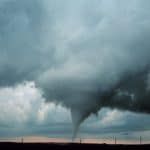A Pakistani view of U.S. nuclear weapons
By Hugh Gusterson | February 4, 2008
Before the United States criticizes Pakistan and other countries about the security of their nuclear arsenals, Washington should make sure its safeguards system is foolproof.
“The [U.S.] Air Force has made substantial changes in its handling of nuclear weapons in the
wake of a B-52 flight last August during which the pilots and crew were unaware they were carrying
six air-launched cruise missiles with nuclear warheads.”
—
“Air Force Alters Rules for Handling of Nuclear Arms,”
Washington Post January 25, 2008.
ISLAMABAD, PAKISTAN, JANUARY 25–At a press conference in Islamabad today, Pakistani Brig. Gen.
Atta M. Iqhman expressed concern about U.S. procedures for handling nuclear weapons. Iqhman, who
oversees the safety and security of the Pakistani nuclear force, said that U.S. protocols for
storing and handling nuclear weapons are inadequate. “In Pakistan, we store nuclear warheads
separately from their delivery systems, and a nuclear warhead can only be activated if three
separate officers agree,” Iqhman said. “In the United States, almost 20 years after the end of the
Cold War, nuclear weapons still sit atop missiles, on hair-trigger alert, and it only takes two
launch-control officers to activate a nuclear weapon. The U.S. government has persistently ignored
arms control experts around the world who have said they should at least de-alert their
weapons.”
Iqhman also questioned the adequacy of U.S. procedures for handling nuclear weapons. He
expressed particular concern about the August 29, 2007, incident in which six nuclear weapons were
accidentally loaded under the wing of a B-52 by workers who did not observe routine inspection
procedures and thought they were attaching conventional weapons to the B-52. The flight navigator
should have caught their mistake, but he neglected to inspect the weapons as required. For several
hours the nuclear weapons were in the air without anyone’s knowledge. “The United States needs to
develop new protocols for storing and loading nuclear weapons, and it needs to do a better job of
recruiting and training the personnel who handle them,” Iqhman said.
Iqhman added the Pakistani government would be willing to offer technical advice and assistance
to the United States on improving its nuclear weapons handling procedures. Speaking anonymously
because of the issue’s sensitivity, senior Pentagon officials said it is Washington’s role to give,
not receive, advice on nuclear weapons safety and surety issues.
Iqhman pointed out that the August 29 event was not an isolated incident; there have been at
least 24 accidents involving nuclear weapons on U.S. planes. He mentioned a 1966 incident in which
four nuclear weapons fell to the ground when two planes collided over Spain, as well as a 1968 fire
that caused a plane to crash in Greenland with four hydrogen bombs aboard. In 1980, a Titan II
missile in Arkansas exploded during maintenance, sending a nuclear warhead flying 600 feet through
the air. In a remark that visibly annoyed a U.S. official present at the briefing, Iqhman described
the U.S. nuclear arsenal as “an accident waiting to happen.”
Jay Keuse of MSNBC News asked Iqhman if Pakistan was in any position to be lecturing other
countries given Pakistani scientist A. Q. Khan’s record of selling nuclear technology to other
countries. “All nuclear weapons states profess to oppose proliferation while helping select allies
acquire nuclear weapons technology,” Iqhman replied. “The United States helped Britain and France
obtain the bomb; France helped the Israelis; and Russia helped China. And China,” he added coyly,
“is said by Western media sources to have helped Pakistan. So why can’t Pakistan behave like
everyone else?”
Iqhman’s deputy, Col. Bom Zhalot also expressed concern about the temperament of the U.S.
public, asking whether they had the maturity and self-restraint to be trusted with the ultimate
weapon. “Their leaders lecture us on the sanctity of life, and their president believes that every
embryo is sacred, but they are the only country to have used these terrible weapons–not just once,
but twice. Paul Tibbets, the pilot of the plane that bombed Hiroshima, said he never lost a night’s
sleep over killing 100,000 people, many of them women and children. That’s scarcely human.”
While Iqhman glared reproachfully at Zhalot for this rhetorical outburst, Zhalot continued: “We
also worry that the U.S. commander-in-chief has confessed to having been an alcoholic. Here in
Pakistan, alcohol is ‘haram,’ so this isn’t a problem for us. Studies have also found that
one-fifth of U.S. military personnel are heavy drinkers. How many of those have responsibility for
nuclear weapons?”
John G. Libb of the
Washington Times asked if Americans were wrong to be concerned about Pakistan’s nuclear
stockpile given the rise of Islamic fundamentalism in Pakistan. Colonel Zhalot replied: “Millions
of Americans believe that these are the last days and that they will be raptured to heaven at the
end of the world. You have a president who describes Jesus as his favorite philosopher, and one of
the last remaining candidates in your presidential primaries is a preacher who doesn’t believe in
evolution. Many Pakistanis worry that the United States is being taken over by religious extremists
who believe that a nuclear holocaust will just put the true believers on a fast track to heaven. We
worry about a nutcase U.S. president destroying the world to save it.”
U.S. diplomats in Pakistan declined comment.
Together, we make the world safer.
The Bulletin elevates expert voices above the noise. But as an independent nonprofit organization, our operations depend on the support of readers like you. Help us continue to deliver quality journalism that holds leaders accountable. Your support of our work at any level is important. In return, we promise our coverage will be understandable, influential, vigilant, solution-oriented, and fair-minded. Together we can make a difference.
Topics: Columnists















